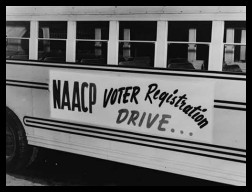Guest blogged by Ernest A. Canning
 Since taking power in statehouses across the nation in 2010, Republicans have been feverishly implementing new restrictions on democracy in advance of the 2012 Presidential election. A number of those laws, clearly --- and often deceptively --- designed to carve out blatant partisan advantage for the GOP next year, were examined during a recent hearing by the U.S. Senate Judiciary Subcommittee on the Constitution, Civil Rights and Human Rights. The video of the hearing on "New State Voting Laws: Barriers to the Ballot" can be viewed here.
Since taking power in statehouses across the nation in 2010, Republicans have been feverishly implementing new restrictions on democracy in advance of the 2012 Presidential election. A number of those laws, clearly --- and often deceptively --- designed to carve out blatant partisan advantage for the GOP next year, were examined during a recent hearing by the U.S. Senate Judiciary Subcommittee on the Constitution, Civil Rights and Human Rights. The video of the hearing on "New State Voting Laws: Barriers to the Ballot" can be viewed here.
This is the second of our two-part analysis of the hearing.
In Part 1, we covered the subcommittee's examination of new polling place photo ID restrictions designed to make it more difficult for lawfully registered (and disproportionately Democratic-leaning) voters to cast their ballots at the precincts on Election Day. That issue --- which included some devastating cross-examination of long-time GOP "voter fraud" front-man Hans Von Spakovsky by Sen. Al Franken (D-MN) --- was the first of three categories, as defined by committee chair Sen. Dick Durbin (D-IL) of new state voting laws covered in the hearings. All of the new voter suppression laws have been recently rammed through Republican-majority statehouses across the country.
In this concluding piece, we will cover the two additional categories examined: laws erecting barriers to the ability of individuals and non-partisan, non-governmental organizations to offer convenient registration for new voters and laws imposing significant reductions on early voting periods. Both are likely to restrict the number of voters able to cast their lawful vote in 2012 and, again, each is likely to disproportionately affect Democratic-leaning voters.
Finally, We'll also touch upon the status of legal challenges to these new laws by democracy proponents and challenges to the Voting Rights Act itself by operatives on the Right. Moreover, it's impossible to look at any of these issues without drawing inferences about what the combination of new laws in all three categories means, particularly in light of the fact that the models for these new laws were drafted by the billionaire Koch brothers-funded, Paul Weyrich co-founded American Legislative Exchange Council (ALEC)...
New Restrictions on Voter Registration
 While Part 1 of our analysis demonstrated, the justifications for polling place photo ID restrictions offered by the disgraced GOP "voter fraud" front man Hans von Spakowsky and by Rep. Todd Rokita (R-IN) proved specious, at least one can say there was an attempt made to defend them.
While Part 1 of our analysis demonstrated, the justifications for polling place photo ID restrictions offered by the disgraced GOP "voter fraud" front man Hans von Spakowsky and by Rep. Todd Rokita (R-IN) proved specious, at least one can say there was an attempt made to defend them.
But not one word was offered either by these witnesses or by the Republicans on the Subcommittee --- Lindsay Graham (R-SC) and John Cornyn (R-TX) --- in defense of either the new laws restricting the ability of individuals or non-governmental groups to register new voters, or for the new laws designed to reduce the window of opportunity to vote during the early voting period prior to Election Day.
On the other hand, there was a great deal of information offered during the hearing on how these new laws would present obstacles to increased democracy.
On the matter of voter registration, Loyola Professor Paul Levitt offered this in his written testimony [PDF], as quoted from the case League of Women Voters of Florida v. Cobb:
In Cobb, a federal court struck down draconian restrictions and penalties in a 2005 FL law that were so severe that they caused the non-partisan League of Women Voters of FL, for the first time in its 67 year FL history, to shut down voter registration. The court ruled that the 2005 FL statute imposed impermissible restrictions on political speech and association.
Undaunted, this year the GOP-controlled FL legislature enacted HB 1355, whose restrictions on voter registration and penalties are so severe that both the League of Women Voters of FL and Democracia USA have been forced to cease all voter registrations in the Sunshine state.
Levitt notes that, under HB 1355, a group or individual lacks the free speech right to engage in voter registration until they "have been issued a number by the state," adding [emphasis added]:
So much for the purported 'Tea Party' concerns about "Big Government."
Levitt goes on to report that the new law affects not only new voters but those who move and need to re-register. Per the "U.S. Census Bureau's Current Population Survey," Levitt adds, "minority citizens disproportionately register...through voter registration drives."
While FL has enacted the most severe restrictions on voter registration in the nation, it is not alone. Levitt notes that TX has enacted similar restrictions, and the GOP in Maine passed a law ending their 34 year tradition of Election Day registration. A “people’s veto” designed to "restore same-day voter registration" has qualified for the November ballot.
New Restrictions on Early Voting
 Levitt also addressed Florida's severe cut back on early voting, which was especially pernicious in that it eliminated voting on the final Sunday before Election Day. Disproportionate numbers of African-Americans and Hispanics voted on the final Sunday in previous elections.
Levitt also addressed Florida's severe cut back on early voting, which was especially pernicious in that it eliminated voting on the final Sunday before Election Day. Disproportionate numbers of African-Americans and Hispanics voted on the final Sunday in previous elections.
Georgia's new law is more restrictive still, in closing on the Friday before Election Day, while Ohio's new law shortens early voting by two weeks and eliminates voting during the last three days prior to the election.
If opponents of the new Ohio law gather 231,300 signatures by Sept. 29, Ohio's new restrictions on early voting will be suspended through the 2012 election.
Levitt, among others, testified that early voting offers local election officials the flexibility to reduce overtime, long lines and chaos on Election Day. It has been wildly popular in many jurisdictions, particularly for Democratic-leaning voters.
Pre-clearance under the Voting Rights Act
 When Congress initially passed, and President Lyndon Johnson signed the Voting Rights Act of 1965, it included a provision (Section 5) which, as described by the Department of Justice (DoJ), "freezes election practices or procedures in certain states until the new procedures have been subjected to review, either after an administrative review by the United States Attorney General, or after a lawsuit before the United States District Court for the District of Columbia."
When Congress initially passed, and President Lyndon Johnson signed the Voting Rights Act of 1965, it included a provision (Section 5) which, as described by the Department of Justice (DoJ), "freezes election practices or procedures in certain states until the new procedures have been subjected to review, either after an administrative review by the United States Attorney General, or after a lawsuit before the United States District Court for the District of Columbia."
Congress determined that case-by-case adjudication was not enough to protect voting rights under the 15th Amendment, so certain jurisdictions with a past history of discrimination must demonstrate that newly enacted voting laws are neither intended to discriminate on the basis of race nor have the effect of denying or abridging the right to vote on the basis of race.
As the U.S. Supreme Court explained in South Carolina vs. Kazenbach, case-by-case adjudication was not only expensive, but Southern election officials would evade the impact of court orders by closing "their registration offices to freeze the voting rolls" or simply "switch to discriminatory devices not covered by the federal decrees."
Viewed in that light, the new spate of voter suppression laws might reasonably be seen as an effort to erect new "discriminatory devices."
On Friday, for example, as The BRAD BLOG detailed, the DoJ declined pre-clearance for new redistricting signed off on by GOP Presidential front-runner Governor Rick Perry in the state of Texas, charging the new maps intentionally discriminated against Latino and African-American voters. They found the new redistricting maps were "adopted, at least in part, for the purpose of diminishing the ability of citizens of the United States, on account of race, color, or membership in a language minority group, to elect their preferred candidates of choice to Congress."
(The DoJ's Voting Unit also had additional questions about the discriminatory effect of the Lone Star State's new polling place Photo ID restrictions as well, suggesting that pre-clearance may be denied for that law too.)
Although periodic challenges to the constitutionality of Section 5 have failed, new challenges have arisen in the wake of a statement made by the U.S. Supreme Court in Nw. Austin Mun. Util. Dist. No. One v. Holder (2009) that Section 5's "preclearance requirements and its coverage formula raise serious constitutional questions."
On Sept. 21, in Shelby County vs. Holder [PDF] U.S. District Court Judge John Bate issued a 151-page opinion that squarely addressed the issue of Section 5's continued validity.
Shelby County contended that, in re-authorizing the Voting Rights Act in 2006 with an overwhelming bi-partisan majority, Congress failed to take into account the substantial improvements that have occurred in the "covered" jurisdictions over the past 45 years. Judge Bates disagreed. The D.C. District Court upheld the constitutionality of Section 5 on the basis of a Congressional finding in its 2006 extension of the VRA that discrimination has continued into the 21st Century --- a finding that was supported by a Congressional record that was more than 15,000 pages in length and included "statistics, findings by courts and the Justice Department, and first-hand accounts of discrimination."
"Congress acts at the pinnacle of its enforcement authority," the court stated, "when it legislates to protect a fundamental right, or when it legislates to prohibit discrimination against a suspect class. Congress did both."
Shelby County vowed an appeal. Edward Blum of the Orwellian-named Project for Fair Representation (PFR), which has helped fund the constitutional challenge to Section 5, said:
Blum is wrong for a number of reasons, among them, jurisdictions that are "covered" by Section 5 are not limited to "southern states." They include AZ, as well as several counties in SD, NY & CA and a number of townships in MI & NH.
But facts may not be quite as important as the political objectives of PFR. According to tax disclosure forms examined by Karoli at Crooks & Liars, PFR is funded and controlled by Donors Trust, LLC, "a tax-deductible slush fund" whose key players include Koch Industries. They contend that PFR is a "union-busting, voter ID, minimum wage, public school attacking project."
Arizona has filed a separate lawsuit challenging the constitutionality of Section 5. That legal challenge is pending before Judge Bates, the same judge who proffered the Shelby County decision.
In his 151-page ruling, Judge Bates cited "a 2004" study which revealed "a significant disparity between voter turnout of Hispanics and Anglos." Bates also "cited evidence presented to Congress in 2006 when it renewed the Voting Rights Act, of 'men (in Arizona) wearing military or tool belts and black T-shirts reading 'U.S. Constitutional Enforcement' approaching Latinos waiting in line to vote, demanding proof of citizenship.'"
The ACLU, which intervened in Shelby County, argues that the recent spate of voter suppression laws suggests "the need for Section 5 is perhaps greater now than it has been in decades."
While they did not specifically address the issue at their 09/08/11 hearing, perhaps the Senate Judiciary subcommittee should consider whether expansion of Section 5 to all jurisdictions which have adopted photo ID restrictions, or other forms of voter suppression, should be the subject of future hearings.
In an exchange of emails with The BRAD BLOG, Prof. Levitt explained that jurisdictions subject to pre-clearance can seek it either from the DoJ or file directly with a three judge panel in the U.S. District Court in DC. A three-judge panel decision is subject to a direct appeal to the U.S. Supreme Court.
FL has sought to by-pass the DoJ by seeking pre-clearance for their new laws restricting voter registration and early voting directly from a U.S. District Court panel. The League of Women Voters of Florida and Democracia USA have now filed a motion to intervene in the federal lawsuit in order to challenge the controversial provisions of the Sunshine State's new restrictions on the right to register and vote.
'Harder to register, harder to cast a ballot, harder to have it counted'
During her testimony, witness Judith Browne Dianis, civil rights litigator & co-director of The Advancement Project, noted one additional category which might have been examined by the Subcommittee: Election Day barriers by Republican-supported and Republican-sympathetic "reactionaries".
As she explained...
Dianis further charged during her testimony that, "collectively," the new assault on voting rights reflects a coordinated effort at "voter suppression, making it harder to register to vote, harder to cast a ballot and harder to have a vote counted."
These new laws, she said, are "the largest legislative effort to roll back voting rights since the post-Reconstruction era."
Neither is it by accident or coincidence.
The fact that Paul Weyrich was a co-founder of ALEC, the billionaire-funded organization that has drafted the models for these voter suppressing laws is significant.
"I don’t want everybody to vote," Weyrich admitted while addressing a right-wing Christian audience in 1980 (see haunting video at right). "[O]ur leverage in the elections goes up as the voting populace goes down," he added after denigrating those who seek "good government" through maximum, informed voter participation as people who suffer from the "goo goo syndrome."
"Americans should be outraged that across the country efforts are being undertaken to make voting harder and to silence them," Dianis said. "After all, Election Day is the one great equalizer. Regardless of race, gender, disability or income, we all have the same power when we go into the voting booth."
[See Part 1 of this report, on the Subcommittee's showdown with the GOP's long-time "voter fraud" front-man Hans von Spakovsky, regarding polling place Photo ID restrictions, right here.]
Ernest A. Canning has been an active member of the California state bar since 1977. Mr. Canning has received both undergraduate and graduate degrees in political science as well as a juris doctor. He is also a Vietnam vet (4th Infantry, Central Highlands 1968).


 Mad World:
Mad World: 'Green News Report' 5/15/25
'Green News Report' 5/15/25
 Plane Corruption and the Future of the DOJ:
Plane Corruption and the Future of the DOJ: 'Deeply Evil Stuff': GOP House Proposes Largest Medicaid Cuts in History: 'BradCast' 5/13/25
'Deeply Evil Stuff': GOP House Proposes Largest Medicaid Cuts in History: 'BradCast' 5/13/25 'Green News Report' 5/13/25
'Green News Report' 5/13/25 And Then They Came for the Mayors...: 'BradCast' 5/12/25
And Then They Came for the Mayors...: 'BradCast' 5/12/25 Sunday 'New Guy, Old Guy' Toons
Sunday 'New Guy, Old Guy' Toons Blowing Smoke.
Blowing Smoke. 'Green News Report' 5/8/25
'Green News Report' 5/8/25 SCOTUS Weighs 'Disastrous' Public Funding of Religious Schools: 'BradCast' 5/7/25
SCOTUS Weighs 'Disastrous' Public Funding of Religious Schools: 'BradCast' 5/7/25 Trump Judge Blocks NC GOP Theft of 2024 Supreme Court Seat: 'BradCast' 5/6/25
Trump Judge Blocks NC GOP Theft of 2024 Supreme Court Seat: 'BradCast' 5/6/25 'Green News Report' 5/6/25
'Green News Report' 5/6/25 Prosecutors Quit After U.S Attny Strikes Deal With Felon Cop: 'BradCast' 5/5/25
Prosecutors Quit After U.S Attny Strikes Deal With Felon Cop: 'BradCast' 5/5/25 Sunday 'Good Buy, Dolly!' Toons
Sunday 'Good Buy, Dolly!' Toons Trump Losing Streak Continues into SECOND Hundred Days: 'BradCast' 5/1/25
Trump Losing Streak Continues into SECOND Hundred Days: 'BradCast' 5/1/25 'Green News Report' 5/1/25
'Green News Report' 5/1/25 100 Daze (w/ Digby and Driftglass): 'BradCast' 4/30/25
100 Daze (w/ Digby and Driftglass): 'BradCast' 4/30/25 Campaign to 'Impeach Trump Again' Gains Fresh Momentum: 'BradCast' 4/29/25
Campaign to 'Impeach Trump Again' Gains Fresh Momentum: 'BradCast' 4/29/25 And Then They Came for the Judges...: 'BradCast' 4/28/25
And Then They Came for the Judges...: 'BradCast' 4/28/25 Trump EPA Guts Enviro Justice Office: 'BradCast' 4/24/25
Trump EPA Guts Enviro Justice Office: 'BradCast' 4/24/25 Largest U.S. Broad-caster Hoaxes Viewers to Help Gut FCC Rules: 'BradCast' 4/23/25
Largest U.S. Broad-caster Hoaxes Viewers to Help Gut FCC Rules: 'BradCast' 4/23/25 FCC on Precipice of Ending All Limits on Corp. Control of Local TV Stations
FCC on Precipice of Ending All Limits on Corp. Control of Local TV Stations GOP Earth Day 2025 Hypocrisies and Dilemmas: 'BradCast' 4/22/25
GOP Earth Day 2025 Hypocrisies and Dilemmas: 'BradCast' 4/22/25 Pope Francis Dies, Trump Still Alive and Criming: 'BradCast' 4/21/25
Pope Francis Dies, Trump Still Alive and Criming: 'BradCast' 4/21/25
 VA GOP VOTER REG FRAUDSTER OFF HOOK
VA GOP VOTER REG FRAUDSTER OFF HOOK Criminal GOP Voter Registration Fraud Probe Expanding in VA
Criminal GOP Voter Registration Fraud Probe Expanding in VA DOJ PROBE SOUGHT AFTER VA ARREST
DOJ PROBE SOUGHT AFTER VA ARREST Arrest in VA: GOP Voter Reg Scandal Widens
Arrest in VA: GOP Voter Reg Scandal Widens ALL TOGETHER: ROVE, SPROUL, KOCHS, RNC
ALL TOGETHER: ROVE, SPROUL, KOCHS, RNC LATimes: RNC's 'Fired' Sproul Working for Repubs in 'as Many as 30 States'
LATimes: RNC's 'Fired' Sproul Working for Repubs in 'as Many as 30 States' 'Fired' Sproul Group 'Cloned', Still Working for Republicans in At Least 10 States
'Fired' Sproul Group 'Cloned', Still Working for Republicans in At Least 10 States FINALLY: FOX ON GOP REG FRAUD SCANDAL
FINALLY: FOX ON GOP REG FRAUD SCANDAL COLORADO FOLLOWS FLORIDA WITH GOP CRIMINAL INVESTIGATION
COLORADO FOLLOWS FLORIDA WITH GOP CRIMINAL INVESTIGATION CRIMINAL PROBE LAUNCHED INTO GOP VOTER REGISTRATION FRAUD SCANDAL IN FL
CRIMINAL PROBE LAUNCHED INTO GOP VOTER REGISTRATION FRAUD SCANDAL IN FL Brad Breaks PA Photo ID & GOP Registration Fraud Scandal News on Hartmann TV
Brad Breaks PA Photo ID & GOP Registration Fraud Scandal News on Hartmann TV  CAUGHT ON TAPE: COORDINATED NATIONWIDE GOP VOTER REG SCAM
CAUGHT ON TAPE: COORDINATED NATIONWIDE GOP VOTER REG SCAM CRIMINAL ELECTION FRAUD COMPLAINT FILED AGAINST GOP 'FRAUD' FIRM
CRIMINAL ELECTION FRAUD COMPLAINT FILED AGAINST GOP 'FRAUD' FIRM RICK SCOTT GETS ROLLED IN GOP REGISTRATION FRAUD SCANDAL
RICK SCOTT GETS ROLLED IN GOP REGISTRATION FRAUD SCANDAL VIDEO: Brad Breaks GOP Reg Fraud Scandal on Hartmann TV
VIDEO: Brad Breaks GOP Reg Fraud Scandal on Hartmann TV RNC FIRES NATIONAL VOTER REGISTRATION FIRM FOR FRAUD
RNC FIRES NATIONAL VOTER REGISTRATION FIRM FOR FRAUD EXCLUSIVE: Intvw w/ FL Official Who First Discovered GOP Reg Fraud
EXCLUSIVE: Intvw w/ FL Official Who First Discovered GOP Reg Fraud GOP REGISTRATION FRAUD FOUND IN FL
GOP REGISTRATION FRAUD FOUND IN FL

































